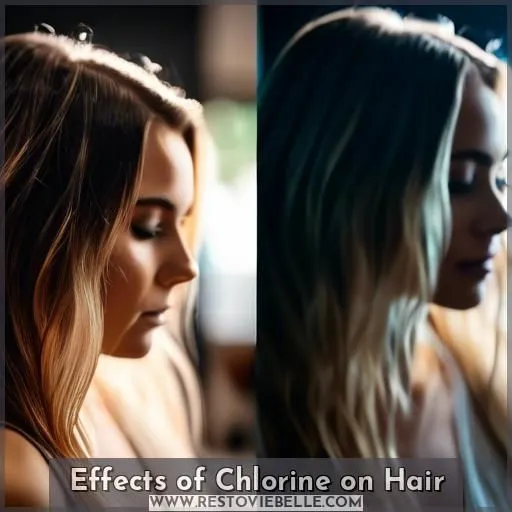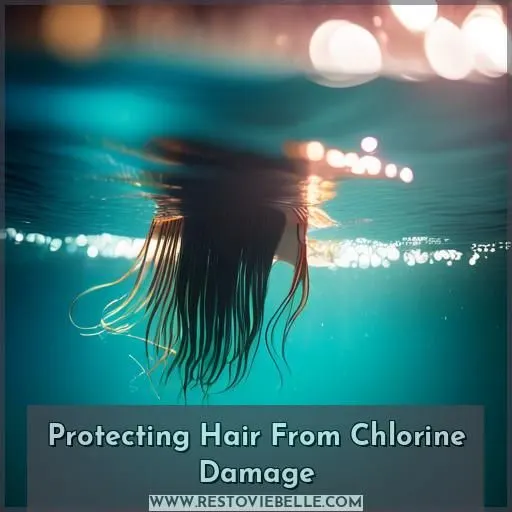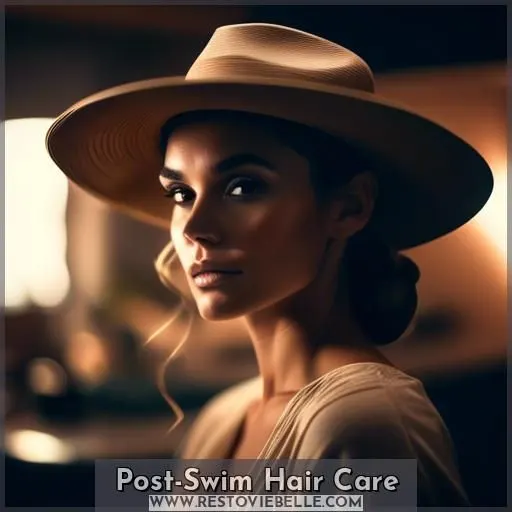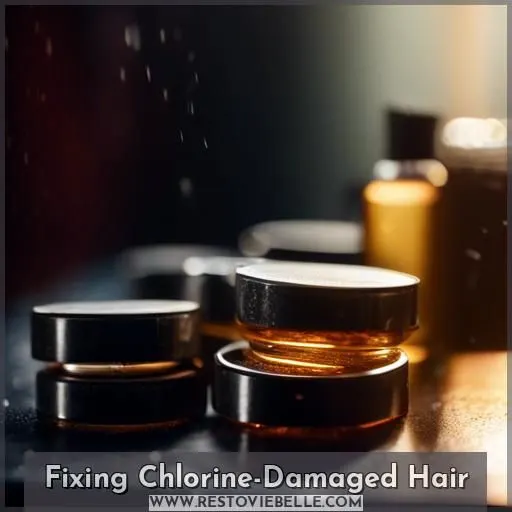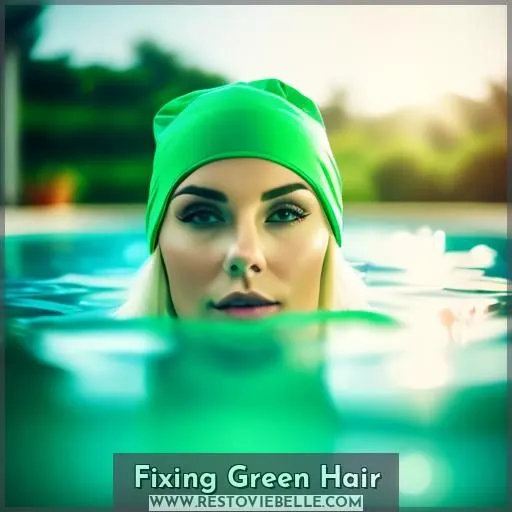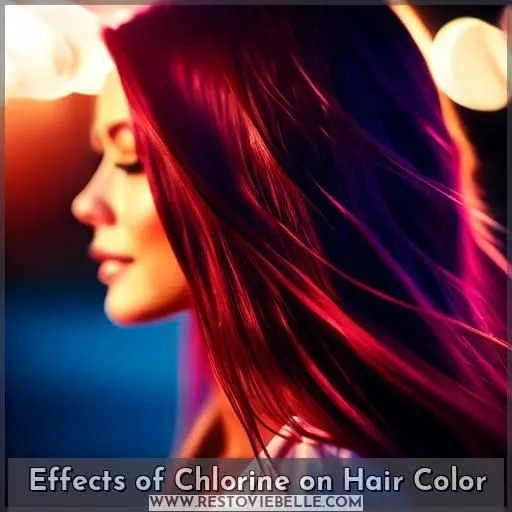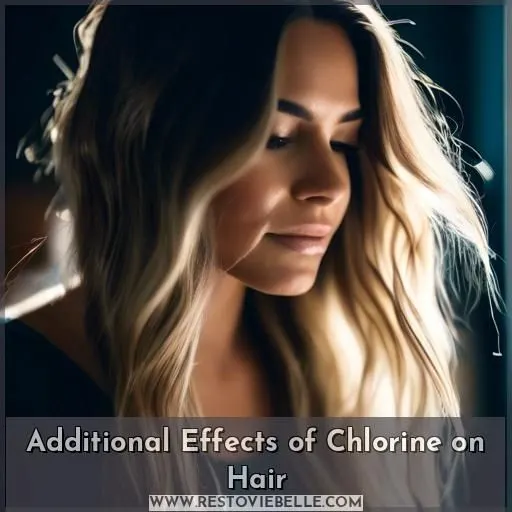This site is supported by our readers. We may earn a commission, at no cost to you, if you purchase through links.
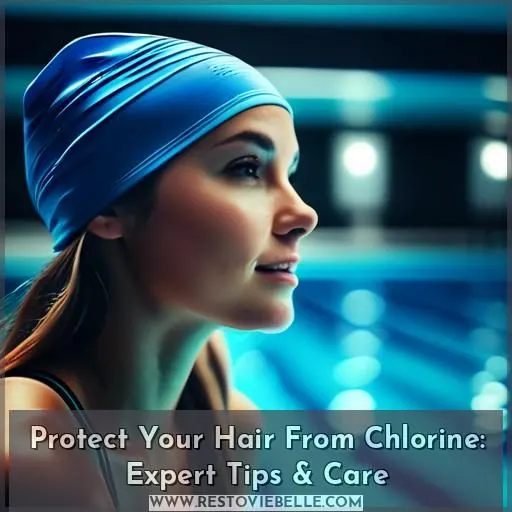 Did you know that 61% of swimmers experience hair damage from chlorine?
Did you know that 61% of swimmers experience hair damage from chlorine?
As an avid swimmer or pool-goer, you need to learn how to protect hair from chlorine.
This guide provides practical tips to minimize chlorine’s drying effects on your precious locks.
From pre-swim preparations to post-swim restoration, we’ll equip you with techniques to keep your hair healthy and vibrant despite frequent pool exposure.
Table Of Contents
- Key Takeaways
- How to Protect Hair From Chlorine?
- Effects of Chlorine on Hair
- Protecting Hair From Chlorine Damage
- Post-Swim Hair Care
- Fixing Chlorine-Damaged Hair
- Fixing Green Hair
- Chlorine Properties
- Effects of Chlorine on Hair Color
- Additional Effects of Chlorine on Hair
- Protection Methods
- Frequently Asked Questions (FAQs)
- Conclusion
Key Takeaways
- Soak your hair with fresh water before swimming to reduce chlorine absorption.
- Apply a moisturizer like conditioner or oil to create a protective barrier.
- Rinse your hair thoroughly with fresh water after swimming to remove any residual chlorine.
- Use a clarifying shampoo once a week or as needed to remove any chlorine or saltwater buildup in your hair.
How to Protect Hair From Chlorine?
To protect your hair from chlorine damage, you can follow these steps:
- Wet your hair before and after swimming: This helps minimize the amount of chlorine absorbed by your hair.
- Apply natural oils like coconut oil or olive oil: These oils act as a protective layer against chlorine and pool chemicals.
- Use a swim cap: Swim caps can limit the amount of chlorinated water that comes in contact with your hair.
- Rinse your hair immediately after swimming: This helps remove chlorine and other pool chemicals from your hair.
- Wash your hair as soon as you can after swimming: Use a gentle, sulfate-free shampoo and follow with a conditioner to replenish moisture.
Remember to avoid getting chlorine in your hair by tying it up in a braid, ponytail, or topknot and keeping your head out of the water as much as possible.
Effects of Chlorine on Hair
Chlorine exposure can have a significant impact on your hair, leading to dryness, brittleness, and increased susceptibility to damage.
This is because chlorine strips the natural oils from your hair, leaving it prone to breakage and frizz.
It can also cause color fading, especially for dyed hair, and even give your hair a greenish tint due to the oxidation of metals in the water.
High porosity hair, which absorbs moisture quickly, is particularly susceptible to chlorine damage.
To protect your hair from these effects, consider wearing a swim cap, rinsing your hair before and after swimming, and using a leave-in conditioner or hair serum to provide an extra barrier against chlorine.
Additionally, using a clarifying shampoo to remove chlorine buildup can help maintain the health of your hair.
Protecting Hair From Chlorine Damage
To protect your hair from chlorine damage, there are several steps you can take.
First, soak your hair with fresh water before swimming to reduce chlorine absorption.
Second, apply a moisturizer like conditioner or oil to create a protective barrier. Hair-friendly oils include coconut, argan, and jojoba. The AquaGuard product can also help moisturize and waterproof your hair.
Additionally, wearing a swim cap can keep your hair dry. If you prefer not to wear a cap, plaiting or twisting your hair before swimming can prevent swelling and loose hair.
After swimming, rinse your hair thoroughly with clean water, shampoo if possible, and use a clarifying shampoo to remove chlorine.
Weekly hair treatments, such as hot oil or masks, can improve hair health.
Post-Swim Hair Care
Post-swim hair care is crucial to maintain healthy hair after exposure to chlorine or saltwater.
- Rinse Thoroughly: After swimming, rinse your hair with fresh water to remove any residual chlorine or saltwater. Use lukewarm water to avoid stripping your hair of its natural oils.
- Shampoo if Necessary: If your hair is visibly dirty, use a gentle shampoo to cleanse your hair. However, avoid shampooing immediately after swimming, as it can strip your hair of its natural oils, leading to further dryness.
- Use a Clarifying Shampoo: Once a week or as needed, use a clarifying shampoo to remove any chlorine or saltwater buildup in your hair. These shampoos contain ingredients that effectively cleanse your hair of impurities and restore its natural pH balance.
- Deep Condition: Apply a deep conditioning treatment to replenish your hair’s moisture after exposure to chlorine or saltwater. Use a store-bought hair mask or create your own by mixing essential oils with coconut or olive oil.
- Detangle Gently: Use a wide-tooth comb to detangle your hair, starting from the ends and working your way up to the roots. Avoid using a brush on wet hair, as it can cause more breakage.
- Air Dry: Avoid using a hairdryer, as the heat can further damage your hair. Instead, let your hair air dry or use a medium heat setting on your hairdryer.
- Weekly Hair Treatment: Incorporate weekly hair treatments, such as hot oil treatments or masks, to improve your hair’s health and prevent breakage.
Remember to also protect your hair before swimming by wetting it with fresh water and applying a leave-in conditioner or detangling spray. Additionally, consider using a swim cap or tying your hair up to minimize contact with the water. By following these steps, you can help maintain healthy, beautiful hair after swimming.
Fixing Chlorine-Damaged Hair
If you’ve spent time in the pool, you’ve likely experienced the effects of chlorine on your hair. The harsh chemicals can leave your locks dry, brittle, and prone to breakage. But don’t worry, there are ways to fix chlorine-damaged hair.
First, use a hair clarifier and natural conditioner to remove any residual chlorine. Then, moisturize your scalp with oils like argan oil. Deep condition twice a week to restore hydration. If your hair is still looking lackluster, consider seeking professional help.
To prevent future damage, consider using hair oils or masks before swimming. Protective gear like swim caps and leave-in conditioners can also help. Remember, it’s not just about avoiding chlorine; it’s about navigating the complexities of pool care.
In the realm of swimming, protecting your hair is just as important as perfecting your stroke. It’s not merely a matter of convenience; it’s about ensuring your hair remains healthy and vibrant. Our suite of products is designed to enhance your swimming experience, from pre-swim preparation to post-swim care.
So, when it comes to chlorine-damaged hair, don’t panic. With the right tools and knowledge, you can unlock the secrets to maintaining healthy, beautiful hair even amidst the ever-evolving world of pool chemicals.
Fixing Green Hair
Green hair is a common problem faced by swimmers and pool-goers. Chlorine, a compound found in pools, can cause hair to turn green, especially color-treated and blonde hair. This discoloration can be unsightly and embarrassing. However, there are solutions to prevent and fix green hair.
- Understanding Green Hair Causes: Chlorine reacts with metals and minerals in the hair, pushing them into the hair shaft, creating a greenish-yellow cast. High porosity hair absorbs excess chlorine, making it more susceptible to discoloration.
- Prevention is Key: To prevent green hair, soak hair with fresh water before swimming. Adding moisturizer, like conditioner or oil, provides extra protection. Hair-friendly oils include coconut, argan, and jojoba. The AquaGuard product moisturizes and waterproofs hair.
- Wear a Swim Cap: Swimming caps keep hair dry. Plaiting or twisting hair before wearing a cap prevents swelling and loose hair. Mesh lycra caps aren’t waterproof, while neoprene caps are used for warmth. Silicone caps are waterproof, hypoallergenic, and create a good seal.
- Post-Swim Care: Rinse hair thoroughly after swimming. Shampoo if possible. Use a clarifying shampoo to remove chlorine. Condition or use a leave-in oil to hydrate hair. Weekly hair treatments (hot oil or masks) can improve hair health.
- Green Hair Treatment: If hair is already green, there are solutions. Use a baking soda and water paste, apply lemon juice wash, soak hair in coke, or wash hair with crushed aspirin dissolved in water. Commercial swimmers’ hair shampoo and treatment products are also available.
Chlorine Properties
Chlorine properties play a crucial role in understanding how to protect your hair from its damaging effects. Chlorine is a chemical compound found in liquid and gas forms, and it’s commonly used in swimming pools and as a disinfectant in drinking water. It’s a powerful oxidizing agent that can change hair color, especially for dyed hair, and push metals and minerals into the hair shaft, creating a greenish-yellow cast.
Chlorine exposure can lead to dry, brittle hair, split ends, and irritation of the skin and scalp. It can also cause hair to appear dry, flat, and matte, making it more susceptible to breakage and heat styling damage. High porosity hair, which absorbs moisture quickly, is particularly prone to absorbing excess chlorine, and all hair types can be damaged by excessive chlorine exposure.
To protect your hair from chlorine damage, it’s essential to take preventive measures. Before swimming, pre-wet your hair with fresh water to reduce chlorine absorption. Apply hair-friendly oils like coconut, argan, or jojoba oil to create a protective barrier. Additionally, use a leave-in conditioner or a product like AquaGuard, which moisturizes and waterproofs hair. Wear a swim cap, such as a silicone cap, which is waterproof and hypoallergenic, and can create a good seal to keep chlorine out.
Post-swim, rinse your hair thoroughly with clean water and shampoo if possible. Use a clarifying shampoo to remove chlorine and other pool chemicals. Apply a leave-in conditioner or natural oils like argan oil to hydrate your hair. Weekly hair treatments, such as hot oil or masks, can improve hair health.
In conclusion, understanding the properties of chlorine and its effects on hair is essential for maintaining healthy, chlorine-resistant hair. By following these tips, you can protect your hair from the damaging effects of chlorine and enjoy swimming without worrying about hair damage.
Effects of Chlorine on Hair Color
Chlorine exposure can have a significant impact on your hair color, leaving it looking dull, dry, and brittle.
- Rinse Hair Before and After Swimming: Wetting your hair before entering the pool reduces chlorine absorption, while rinsing afterwards helps remove chlorine residue.
- Apply Natural Oils: Coconut, argan, and jojoba oils can create a protective barrier on your hair, preventing chlorine from stripping away natural oils.
- Use Swim Spray: Specialized products designed to protect hair from chlorine can help maintain the health and color of your hair.
- Wear a Swim Cap: Silicone caps provide the best protection, as they’re waterproof and create a good seal around your hair.
Additional Effects of Chlorine on Hair
Chlorine’s effects on your hair can be quite damaging, leaving it dry, brittle, and prone to breakage. It strips your hair of its natural oils, which can lead to split ends and a loss of shine. Additionally, chlorine can change the color of your hair, turning it green, especially for color-treated and blonde hair. This color change is due to the oxidation of hair color and the deposition of metals and minerals into the hair shaft, creating a greenish-yellow cast.
To protect your hair from chlorine damage, rinse your hair before and after swimming to reduce chlorine absorption. You can also apply natural oils like coconut oil or olive oil to provide an extra layer of protection. Wearing a swim cap is also a good idea, as it keeps your hair dry and prevents direct contact with chlorinated water.
After swimming, rinse your hair thoroughly with clean water to remove any remaining chlorine. Use a clarifying shampoo to remove chlorine buildup and restore your hair’s natural shine. Apply a leave-in conditioner or hair serum to replenish the moisture that chlorine has stripped away. Weekly hair treatments, such as hot oil or masks, can further improve your hair’s health.
If your hair has already been damaged by chlorine, consider using a hair clarifier and natural conditioner to help restore moisture and strength. Deep conditioning twice a week can also be beneficial, especially for high porosity hair that absorbs moisture quickly. Applying natural oils like argan oil can help to nourish and protect your hair. If necessary, seek professional help to address the damage.
Protection Methods
To protect your hair from chlorine damage, it’s essential to take poolside precautions. Before diving in, soak your hair with fresh water to reduce chlorine absorption. Apply hair-friendly oils like coconut, argan, or jojoba to create a protective barrier. For an extra layer of protection, consider using waterproof products like AquaGuard, which moisturizes and waterproofs your hair.
When it comes to swimming caps, choose wisely. Silicone caps are waterproof, hypoallergenic, and create a good seal. Mesh lycra caps aren’t waterproof, and neoprene caps are used for warmth, not waterproofing. Plaiting or twisting your hair before wearing a cap prevents swelling and loose hair.
After swimming, rinse your hair thoroughly with clean water to remove chlorine. Use a clarifying shampoo to remove any remaining chlorine residue. Condition or apply a leave-in oil to hydrate your hair. Weekly hair treatments like hot oil or masks can improve hair health.
In the realm of hair hydration techniques, remember that prevention is key. By following these steps, you’ll be able to navigate the complexities of chlorine exposure and keep your hair healthy and vibrant. It’s not merely about looking good; it’s about feeling confident and protected. So, take these poolside precautions seriously, and your hair will thank you.
Frequently Asked Questions (FAQs)
How often should swimmers wash their hair after swimming?
You should wash your hair immediately after swimming to remove chlorine buildup. Use a clarifying shampoo to strip away chlorine and follow up with a deep conditioner or hair mask to replenish moisture.
What are the best hair products for swimmers to use?
Can’t disguise the struggle, swimmers? Gentle cleansing and glossy serums to the rescue! Clarifying shampoos whisk away chlorine buildup, while nourishing oils revive dry, brittle strands.
Can swimming caps prevent chlorine damage to hair?
Yes, swimming caps create a protective barrier around your hair, shielding it from chlorine exposure and preventing damage.
How can swimmers protect their hair from green hair after swimming?
You don’t have to resign yourself to green locks. Try baking soda pastes, lemon juice rinses, or swimmers’ shampoo.
What are the benefits of using a clarifying shampoo after swimming?
Using a clarifying shampoo removes chlorine, minerals, and product buildup. It’ll revive your hair after swimming, leaving it feeling clean and healthy.
Conclusion
Preventing chlorine damage doesn’t have to be daunting. True, you love swimming, but that doesn’t mean sacrificing gorgeous locks. Follow this guide’s tips on how to protect hair from chlorine before, during, and after pool time.
With the right preparation and restorative care, you can indulge your passion while keeping your hair healthy and vibrant.
